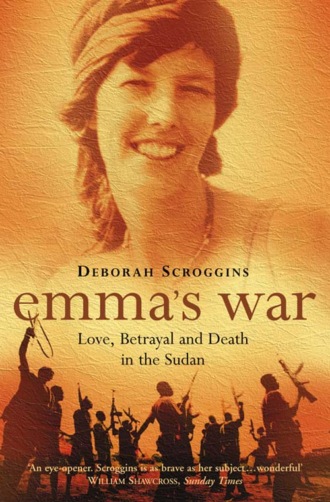
Полная версия
Emma’s War: Love, Betrayal and Death in the Sudan
Karadawi introduced Emma to many of the young Africans studying at Oxford University. Heirs to the university’s tradition of training colonial elites, the Africans tended to come from the most privileged families in their own countries. Some were hereditary chiefs. Most had held or were on their way to holding top positions in their governments or armed forces-perhaps with the next coup. In their papers and in their seminars, they spoke of economic development and the need for democracy and institution building. But in private they talked of power as a family affair, a game of intrigue, honour and greed into which they had been born and in which they might well die.
Emma had never shown any interest in ideology, though as an art student she had disavowed her father’s Conservatism. The left-leaning political opinions she voiced could have come straight out of the pages of The Guardian. She felt a little insecure in the highly intellectual environment of the refugee programme. But Karadawi assured her that as an artist she had at least as much to offer refugees as the so-called experts who were always blathering on about ‘early warning systems’ or ‘coordination planning’. ‘Most of the refugees in Sudan can’t read. You can use your pictures to teach them,’ he told her, one friend remembers. In any event, it was not a political programme that attracted her to the world of Karadawi and his friends. It was more like the high drama of it all, the almost Shakespearean sense that, behind the sham parties and borrowed ideologies, character is all. A few people, some of them her friends, might decide the fate of whole countries. She could speak as glibly as anyone else about the need for refugee participation and grassroots involvement, but her friends believe that, inside, she thrilled to the stories of kings and queens, prophets and warriors, heroes and villains.
Karadawi never discussed his relationship with Emma, but everyone at the refugee programme knew they were having an affair. When Emma staged an exhibition at Oxford’s Poster Gallery of the aerial photographs she had taken on her trip with Bill Hall, Karadawi invited all his friends to come. The relationship distressed Karadawi’s wife, Selma, but she kept her feelings to herself. Sudan, like most of Africa, is polygamous. While northern Sudanese men expect strict fidelity from their wives, few Sudanese women are in a position to demand the same from their husbands. ‘Let us just say Ahmed’s wife was very tolerant,’ a Sudanese colleague of Karadawi’s laughed indulgently when asked about Selma’s response to the affair. And Karadawi was not the only Sudanese man to fall for Emma. Hamid el-Tayeb Zaroug, another northern Sudanese refugee official, met her while on sabbatical at Oxford. Zaroug was a Sudanese government administrator of the Ethiopian refugee camps that Emma had heard much about from Karadawi. He continued writing to her after he returned to Sudan.
Emma finished her degree in early 1986. For a short time, she went to work for the art department of Harper’s & Queen. The job didn’t work out. The magazine’s arbiters of fashion expected the young girls they hired to model the smart clothing featured in its pages. Emma insisted on wearing her trademark Indian caftans and big wooden bangles. When Tayeb Zaroug invited her to make a field trip to the refugee camps at Showak, she decided to take him up on his offer. She had saved some money from waiting on tables. At the end of 1986, she wrote to Zaroug that she had booked a flight to Khartoum. She planned to make a display of her photos for refugee children. Alex de Waal remembers her coming over to the Oxford flat he shared with his Eritrean girlfriend, excitedly asking for help translating captions for her photos into the Tigrinya language.
Zaroug wrote back immediately. ‘I read [your] letter three times to make sure I went over every word,’ he said. ‘Your face with that beautiful smile is always in front of me…. You don’t believe how much I do want to see you my sweet untamed cat who trained me so much in UK on how to accept pain from whom you love. All I need from England is that I do want Emma and please tell her to come soon.’
Конец ознакомительного фрагмента.
Текст предоставлен ООО «ЛитРес».
Прочитайте эту книгу целиком, купив полную легальную версию на ЛитРес.
Безопасно оплатить книгу можно банковской картой Visa, MasterCard, Maestro, со счета мобильного телефона, с платежного терминала, в салоне МТС или Связной, через PayPal, WebMoney, Яндекс.Деньги, QIWI Кошелек, бонусными картами или другим удобным Вам способом.


